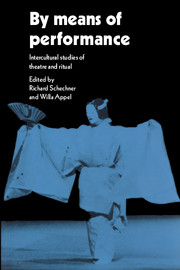Book contents
- Frontmatter
- Contents
- List of figures
- Notes on contributors
- Concerning Victor Turner
- Introduction
- 1 Are there universals of performance in myth, ritual, and drama?
- 2 Magnitudes of performance
- 3 Liminality: a synthesis of subjective and objective experience
- 4 The Yaqui deer dance at Pascua Pueblo, Arizona
- 5 A Yaqui point of view: on Yaqui ceremonies and anthropologists
- 6 Performance of precepts/precepts of performance: Hasidic celebrations of Purim in Brooklyn
- 7 The significance of performance for its audience: an analysis of three Sri Lankan rituals
- 8 What does it mean to “become the character”: power, presence, and transcendence in Asian in-body disciplines of practice
- 9 Korean shamans: role playing through trance possession
- 10 The practice of noh theatre
- 11 The profanation of the sacred in circus clown performances
- 12 Ethnographic notes on sacred and profane performance
- 13 The spatial sense of the sacred in Spanish America and the American South and its tie with performance
- 14 Space and context
- 15 The transformation of consciousness in ritual performances: some thoughts and questions
- 16 Universals of performance; or amortizing play
- Appendix
- Bibliography
- Index
7 - The significance of performance for its audience: an analysis of three Sri Lankan rituals
Published online by Cambridge University Press: 05 June 2012
- Frontmatter
- Contents
- List of figures
- Notes on contributors
- Concerning Victor Turner
- Introduction
- 1 Are there universals of performance in myth, ritual, and drama?
- 2 Magnitudes of performance
- 3 Liminality: a synthesis of subjective and objective experience
- 4 The Yaqui deer dance at Pascua Pueblo, Arizona
- 5 A Yaqui point of view: on Yaqui ceremonies and anthropologists
- 6 Performance of precepts/precepts of performance: Hasidic celebrations of Purim in Brooklyn
- 7 The significance of performance for its audience: an analysis of three Sri Lankan rituals
- 8 What does it mean to “become the character”: power, presence, and transcendence in Asian in-body disciplines of practice
- 9 Korean shamans: role playing through trance possession
- 10 The practice of noh theatre
- 11 The profanation of the sacred in circus clown performances
- 12 Ethnographic notes on sacred and profane performance
- 13 The spatial sense of the sacred in Spanish America and the American South and its tie with performance
- 14 Space and context
- 15 The transformation of consciousness in ritual performances: some thoughts and questions
- 16 Universals of performance; or amortizing play
- Appendix
- Bibliography
- Index
Summary
Performances of Theravada Buddhist Sri Lanka cover a spectrum ranging from ritual to theatre, usually associated with different levels and stages of social organization (tribal, agrarian, industrial). All, however, are performed in present day Sri Lanka and it is not uncommon for the same individual to participate in all of them. An analysis of these three types of performances and their interrelationships may provide insights into the nature of their significance for their audience/participants and help extend present definitions of such relationships. The three performances are: a pirit ceremony; a Sanni Yakuma ritual; and a theatre piece called Maname.
A pirit ceremony
This is a Theravada Buddhist ritual, one of the few major ritual performances associated with the “higher” religion (as distinct from the folk Buddhist rituals) and where the performers are Buddhist monks. The ceremony consists of monks reciting specific Buddhist texts in Pali, as protection against sickness, disease, demonic afflictions, and evil planetary influences. The magical transference occurs by an “act of truth” or satyakriya. The truth of the statements uttered by the monks is believed to generate a power that has a beneficial, protective, prophylactic effect. The performance is serious, sacred, largely non-dramatic and has very little element of play in it.
- Type
- Chapter
- Information
- By Means of PerformanceIntercultural Studies of Theatre and Ritual, pp. 118 - 130Publisher: Cambridge University PressPrint publication year: 1990
- 1
- Cited by



